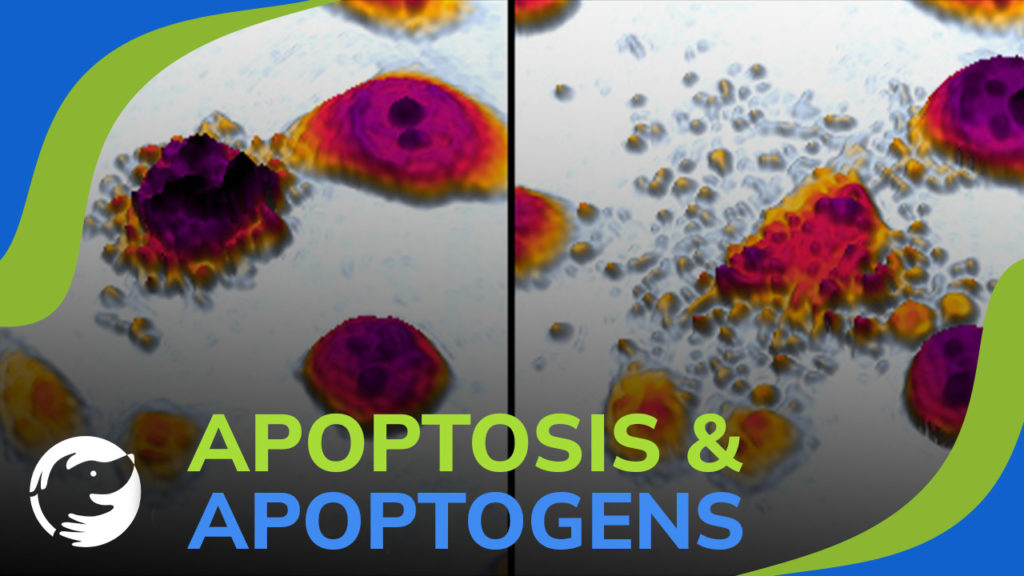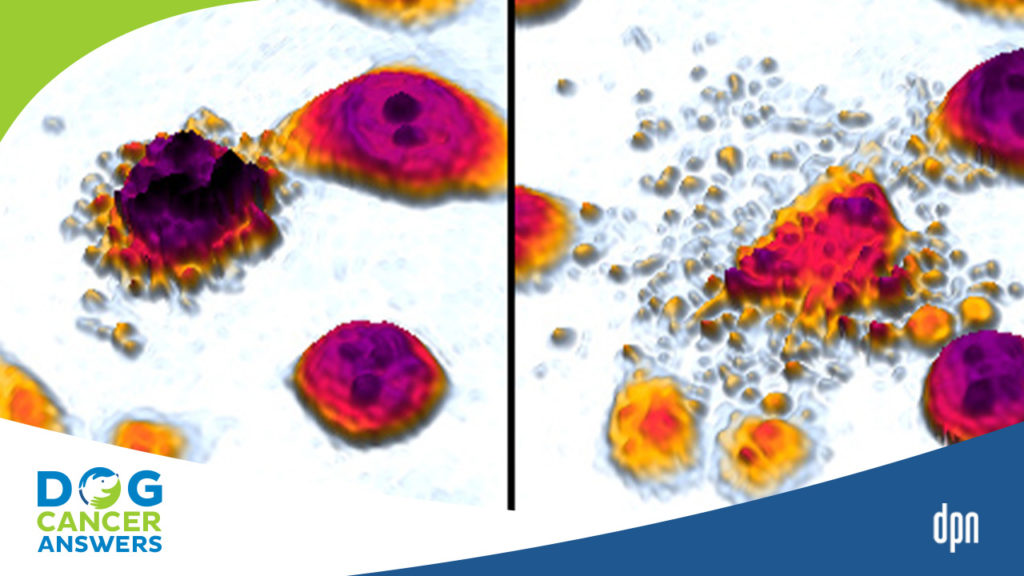
Apoptosis and Apoptogens
How do chemotherapy agents use apoptosis to fighting dog cancer in dogs, and how it can be activated through natural means?
James Jacobson: In The Dog Cancer Survival Guide, Dr. Dressler, you talk a lot about the role of Apoptosis in dog cancer. First of all, easy question but I never heard of Apoptosis, what is it and why it’s important?
Dr. Demian Dressler: Well, it’s a really basic process in Science and we’ve all learned about this assuming that we took high school Science. It gets about two paragraphs in your Biology text book. What it is, is called programmed cell death or programmed cell suicide. It’s the body’s way of clearing out derange cells. When the cell becomes deranged, when it becomes pre-cancerous, or cancerous or other situation, say if it’s infected, or it’s injured or other variety of different derangements that can happened in a cell to screwed it up, the cell is supposed to, in many cases, turn on specific genes that cause it to simply destroy itself. It’s a very quiet process when we talk about cell suicide it sounds very violent because suicide is a charged word. But Apoptosis is a very machine like, very deliberate, very healthy in life giving process. The cell turns on certain little machines enzymes and what not within the cell, chops it up into little pieces and the little pieces just get recycled into new body components. So, that’s Apoptosis in a nutshell.
James Jacobson: There are way, there’s a ways like to cause Apoptosis to happen because in the book you talk about that cancer cells don’t experienced Apoptosis.
Dr. Demian Dressler: That’s right. Cancer’s one of the hallmarks of cancer that we see widespread in almost all cancers is that they lack Apoptosis. They’ve been able to maneuver around this genetic machinery that’s supposed to be turned on. What that allows them to do is, they’re deranged, but they don’t commit suicide, they just keep on living, keep on growing and can overwhelm the body. Yet, there are ways to turn on this special genetic signal to help those cells commit suicide in a way that’s healthy for the body. As a matter of fact, the huge industry right now, the pharmaceutical industry, its huge amount of money invested in new and creative ways of turning on Apoptosis or programmed cell suicide of cancer cells with the use of drugs and other therapies. Interesting thing is that in Mother Nature there are naturally occurring compounds that had been shown in labs, in test tubes, in petri dishes and also in living animals. These substances are capable of turning on Apoptosis in the body when taken by mouth when orally available. Then a matter of fact…oh sorry Jim, go ahead.
James Jacobson: I was kind of started lead you into that… so in addition to the pharmaceutical methods there are natural ways which include the nutriceutical that you created, which is Apocaps.
Dr. Demian Dressler: Apocaps and that was the fundamental mechanism that was used in the engineering of Apocaps. Apocaps is designed specifically to include compounds called a pathogens which are special substances found in nature, found in plants that have been demonstrated to turn on this healthy process of Apoptosis.
James Jacobson: Dr. Ettinger, what as an Oncologist, what’s your perspective on the role of Apoptosis and getting it started?
Dr. Susan Ettinger: I think it’s another mechanism, or another treatment modality that we have. I think it’s actually very in it, much in its infancy, and I think we’re really learning how to incorporate it into the protocols and you know to maximize a therapeutic benefit for all of our patients. But I think it’s a really exciting approach and another arsenal, another tool we have to combat cancer.
James Jacobson: Do traditional chemotherapy protocols deal with Apoptosis or not?
Dr. Susan Ettinger: They do, I mean just by some of the mechanism of cell death, with cancer cells, but not really as directly as the Apoptogens that were being designed now or implemented now.
James Jacobson: In other words, when they’re developing chemotherapy, they’re not specifically looking at using the mechanism of Apoptosis to kill the cells, but it’s a by-product or is that what you…
Dr. Susan Ettinger: I mean most of the chemotherapy drugs are more into direct sell, killing mechanisms by damaging some aspect of the cancer cell usually in the mitosis which is the division, so they target some aspect of that…
James Jacobson: Yeah, I’m just sort of curious about the mechanism of Apoptosis, there’s mitosis and what’s the other way of killing cells?
Dr. Demian Dressler: Yeah, there’s a couple of thrusts of the therapy, the targets. So you’ve got cell division and then you’ve got cell death. That’s the gas pedal and the brake pedal. The emphasis traditionally in traditional chemotherapy has been on eliminating the cell divisions. So the problem that we’re getting into with this though is that chemotherapy agents actually in many cases will induce Apoptosis. They’re actually are Apoptogens. The reason why this is sometimes difficult to answer when we’re talking about traditional chemotherapy, is that the truth of it is, is that we have a few different explanations for why these chemo agents work, but there actually is more going on than we really know about. The mechanism by which the chemo agent work is very well described in one particular aspect but then the more that you look at it, the more you realized, hey wait, this thing is actually increasing mitochondrial release of cytochrome B and it is increasing free radical concentrations on the cancer cell it’s not only paralyzing the mitotic spindle or whatever. So we talk about the chemo agent as if they do blanketing blank but when you really start to look at how they work, we find that the situation is much more complex. But the thrust of the way that the chemotherapy agents have been designed is through cytotoxicity most of the time, if I’m not mistaken. But as it turns out there is overlap also in…
James Jacobson: Is the cytotoxicity is poisoning cells?
Dr. Susan Ettinger: It’s just a direct cell death, I mean toxic to the cells.
James Jacobson: Toxic to the cells, and when you contrast that with an approach like Apocaps, which is not, Are you poisoning the cells? Or no, you’re not, right?
Dr. Demian Dressler: It’s a different process of cell death. It’s one that’s characterized by a very specific metabolic pathway where there’s a certain sequence of events that involve the DNA, involve cast bases and two different paths, one of them that involve caspase and of them that doesn’t and the end result is a particular cellular change that can be observed under a microscope that has a certain characteristic look to it. Traditional chemotherapy has not been oriented to towards amplifying that specifically it just as it involved and okay we’re gonna kill these cancer cells we don’t really care how we’re doing it. It’s more of a sort of a shotgun approach, cytotoxicity is just cell death and will kill as many cancer cells as we can before it hurt the body at the end. We’re looking at a more targeted strategy in capitalizing on a specific cancer cell death mechanism.
James Jacobson: Great! Dr. Dressler, Dr. Ettinger, thank you. There’s much more information on Apoptosis and the role it has on dog cancer in The Dog Cancer Survival Guide. Thank you both for being with us today.
Dr. Susan Ettinger: Thanks.
Dr. Demian Dressler: Thank you.
Topics
Did You Find This Helpful? Share It with Your Pack!
Use the buttons to share what you learned on social media, download a PDF, print this out, or email it to your veterinarian.
Editor's Picks
CATEGORY



